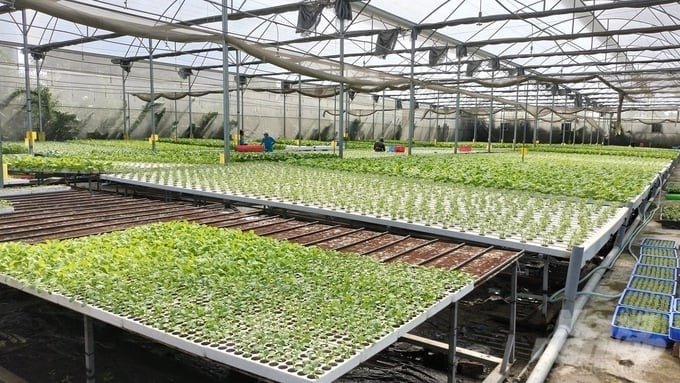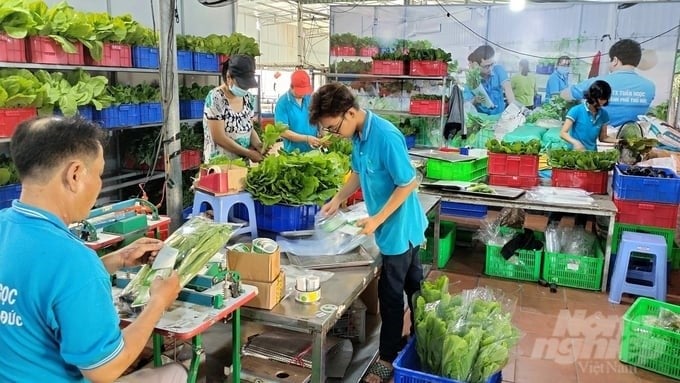November 22, 2025 | 03:18 GMT +7
November 22, 2025 | 03:18 GMT +7
Hotline: 0913.378.918
November 22, 2025 | 03:18 GMT +7
Hotline: 0913.378.918
"The vegetables of Tuan Ngoc Cooperative reaching consumers all meet the "5 NOs" standard: No pesticides (only using homemade biological preparations made from ginger, garlic, and chili to help plants avoid fungus and pests); No genetic modification of seeds with a clear origin; No contamination with heavy metals such as lead and arsenic; No infection with bacteria, specifically two types of bacteria that cause intestinal diseases, namely E. coli and Salmonella; and No use of chemical fertilizers. The harvested vegetables are beautiful and truly clean, so anyone can eat them right at the garden," Mr. Ngoc shared.
With a passion for agriculture and the desire to bring “clean and safe meals” to consumers, in 2017, Mr. Ngoc quit his banking job and boldly started his business again by growing high-tech hydroponic vegetables.

The advantage of the hydroponic model is that vegetables are grown in the membrane house, avoiding insects and pests. Photo: Tran Trung.
Visiting Mr. Ngoc's hydroponic vegetable farm in Long Truong ward (Thu Duc City, Ho Chi Minh City) is like getting lost in the world of vegetables. Besides traditional vegetables such as lettuce, green mustard, yu choy, water spinach, etc., there is also the appearance of cherry tomatoes, which are an endemic agricultural product of cold countries but still grow well and are fruitful.
Mr. Ngoc said that in June 2017, he established a clean vegetable growing cooperative group and upgraded it to a cooperative in 2019. Tuan Ngoc Agricultural Cooperative specializes in providing types of vegetables, such as cruciferous vegetables, lettuce, amaranth, malabar spinach, crown daisy, etc., according to the high-tech hydroponic method, with the motto "clean from the heart".
According to Mr. Ngoc, the advantage of the hydroponic model is that vegetables are grown in the membrane house, avoiding insects and pests. Above the membrane house’s ceiling is a nylon membrane, getting light for the plants and eliminating the need to improve the soil between crops or stop farming during storms, thereby helping to stabilize harvest and selling prices all year round.
In the membrane house, a temperature and humidity sensor system is installed. When the temperature increases to above 35–40oC, the sensor will automatically turn on the atomizing system to reduce the temperature in the membrane house, creating favorable conditions for vegetable plants to grow. When the humidity is too high, the fan system automatically activates cooling. In the morning, the fan system automatically activates to bring in air from outside to help the plants photosynthesize better. At night, the system automatically turns off the water pump.
Therefore, vegetables are not affected by adverse weather conditions outside. When the water temperature increases to 28–35oC, the amount of oxygen in the water is greatly reduced. The system will then pump oxygen into the water, from which the water will provide oxygen to the roots to help plants grow the best.
Mr. Ngoc added that, compared to growing vegetables on land, the hydroponic model has high productivity. Specifically, with a 1,000-m2 garden with soil growing, the yield only reaches 10kg of vegetables/day, but hydroponic growing can reach 100kg/day. In addition, hydroponic vegetable growing does not require a large area. The selling price of vegetables is also higher, especially since vegetables are less affected and damaged by natural disaster risks.

Tuan Ngoc Agricultural Cooperative always wishes to bring “clean and safe meals” to consumers. Photo: Tran Trung.
From the initial 1,000 m2, as of now, the hydroponic vegetable farming area of Tuan Ngoc Agricultural Cooperative has increased 10 times with 11 types of vegetables, an average yield of 1 ton/day, and a revenue of no less than VND 20 million. In particular, the Cooperative’s vegetables are brought directly into four clean food store chains and supermarkets. In 2023, the Cooperative was honored to be one of 63 typical cooperatives in Vietnam, as voted by the Central Committee of Vietnam Farmers' Association.
“The Cooperative's initial goal was to produce high-quality vegetables, targeting consumers with the knowledge and economic conditions to consume hydroponic vegetables and clean food. After a period of operation, the Cooperative has balanced costs, thus aiming to produce for a more popular and widespread consumer class. The Cooperative's vegetable prices since 2018 have not changed, although material costs have increased. This is possible thanks to the work of managing, always searching for new things, and saving farm operating costs," Mr. Ngoc shared.
Ms. Nguyen Thanh Xuan, Chairwoman of the Ho Chi Minh City Farmers' Association, assessed that Tuan Ngoc Hydroponic Vegetable Cooperative has applied new science and technology to production. In addition, the Cooperative also focuses on preservation and processing processes to ensure standards and improve product quality.
The Cooperative has made many contracts with businesses and farmer households in the production, processing, and consumption of products. At the same time, the Cooperative also mobilized additional members from provinces and cities to supplement the vegetable source for the Ho Chi Minh City market in the form of supply chain linkage.
"Tuan Ngoc Hydroponic Vegetable Cooperative has proactively coordinated with Thu Duc City Farmers' Association and districts in guiding, training, and transferring science and technology to farmer-member households in the area", Ms. Xuan said.
Translated by Huyen Vu Thu

(VAN) The information was shared at the seminar 'Urban Agriculture - Solutions for Developing Green Spaces,' organized by the Kinh te & Do thi Newspaper and the Biotechnology Center of Ho Chi Minh City.
/2025/11/19/4141-2-132831_216.jpg)
(VAN) One of Japfa's outstanding solutions is implementing digital transformation and artificial intelligence (AI) to optimize operations, enhance productivity, and advance sustainable development.
/2025/11/19/4847-1-093540_448.jpg)
(VAN) The Gia Lai Provincial People’s Committee had a working session with the delegation of the U.S. Department of Agriculture, the State of Idaho, and representatives of the State's leading enterprises.

(VAN) Ca Mau has a sufficient foundation to become a strong regional aquaculture center, where production integrates the economy, the environment, and the lives of the people.

(VAN) SEIKI Group envisions itself as a pioneer in the ‘dual transformation’ of digital technology and green industry, standing alongside the Government and Vietnamese businesses in their pursuit of sustainable development.

(VAN) The VNGEONET network affirms Viet Nam's progress in mastering digital space, providing a precise positioning data platform to serve socioeconomic development.
/2025/11/14/3247-1-184556_35.jpg)
(VAN) Thai Nguyen is methodically implementing digital transformation in the livestock sector, laying the foundation for a modern, transparent, and sustainable agriculture.